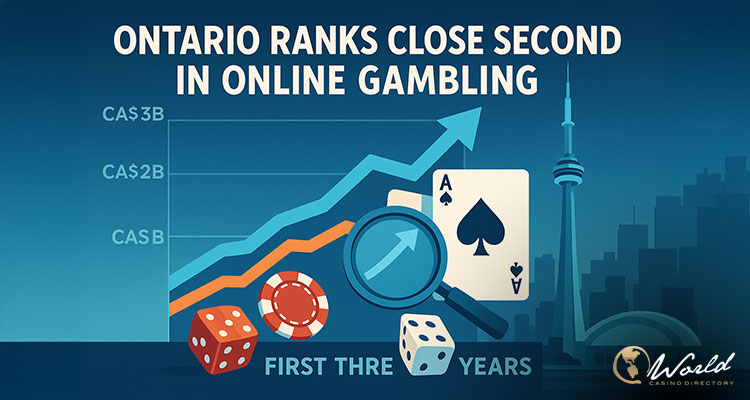Three years into its journey with regulated online gambling, Ontario has firmly established itself as one of North America’s dominant digital gaming markets. The province now ranks second overall in total online gambling revenue among North American jurisdictions with both online casinos and sports betting—closely trailing Michigan and outperforming key U.S. competitors like Pennsylvania and New Jersey.
According to an in-depth analysis by Gaming News Canada, Ontario generated approximately USD $5.22 billion in iGaming revenue over its first three years, using the Bank of Canada’s average exchange rate for conversion. While Michigan leads with $5.97 billion during the same benchmark period, Ontario’s figures notably exclude revenue from the Ontario Lottery and Gaming Corporation (OLG), which has historically contributed about 20% of the province’s total online gambling returns. Including OLG’s most recent figures could very well push Ontario into the top position.
Ontario’s journey began in April 2022, when the province opened its market to private operators under a regulated framework. The data speaks volumes about the effectiveness of that strategy, with the province pulling ahead of Pennsylvania ($4.1B) and New Jersey ($1.55B) in total iGaming revenue for the same time spans.
Casino Gaming Drives Ontario’s Record-Breaking Growth
The 2024–25 fiscal year proved particularly fruitful for Ontario’s iGaming industry, setting new benchmarks in revenue and wagering activity. As reported by iGaming Ontario, total gross gaming revenue surged by 32% year-over-year to CA$3.20 billion, the province’s highest annual total since launching its competitive market.
Online casino games remained the dominant revenue driver, contributing CA$2.4 billion—an increase of 36% from the previous year. Sports and novelty betting followed with CA$724 million, while peer-to-peer poker remained stable at CA$66 million. In terms of player spending, the casino category again led the way with CA$69.6 billion in wagers. Betting saw CA$11.4 billion in stakes, and poker activity climbed modestly to CA$1.7 billion.
Notably, the final quarter of the fiscal year ending March 2025 was Ontario’s most lucrative to date, generating CA$903 million in revenue on CA$22.9 billion in wagers.
BetMGM Claims Leadership in Ontario’s Competitive Market
Ontario’s regulatory approach—allowing dozens of private operators to compete alongside government-run platforms—has fostered a highly competitive market landscape. As of early 2025, 49 licensed operators run 84 gaming websites in the province.
Among these, BetMGM has declared itself the top performer in Ontario’s online casino segment. Speaking at the Canadian Gaming Business conference, BetMGM CEO Adam Greenblatt stated, “We have just got Q1 financial numbers from Ontario and we have increased our market share… and we remain the market leader in iGaming.” He previously asserted at the 2024 SBC Summit North America that BetMGM held a 22% market share across both casino and sports betting.
Regulated Growth Outpaces the Rest of Canada
Ontario’s open-market model has propelled it far ahead of other Canadian provinces. British Columbia and Alberta—still operating under government monopolies—project significantly lower returns. For comparison, B.C.’s projected revenue for 2024–25 sits at CA$470 million, while Alberta’s is CA$235 million. Quebec reports CA$2.9 billion in total gambling income, but that includes all gambling verticals such as land-based casinos and lotteries, not just online.
Heidi Reinhart, Chair of iGaming Ontario, emphasized the province’s achievements, saying, “These results show Ontario is home to a truly dynamic iGaming market with a strong roster of operators and a world-class list of games available for players.”
Challenges Remain with Illegal Gambling Activity
Despite Ontario’s impressive numbers and robust regulatory framework, the province continues to battle against illegal and unregulated gambling operators. A recent IPSOS study commissioned by iGaming Ontario and the Alcohol and Gaming Commission of Ontario (AGCO) found that while 83.7% of players used licensed sites in 2025, 16.3% admitted to gambling exclusively on unregulated platforms—up from 13.6% the year before.
The report also indicated that 20.2% of those who primarily use regulated platforms had also placed bets on illegal sites. This suggests the grey and black markets remain stubborn competitors in the Canadian landscape. The AGCO has increased enforcement efforts, but critics argue that progress has stalled and called for more aggressive measures to level the playing field.
AGCO acknowledged the challenges in a recent statement: “The data also underscores that a notable amount of gaming continues to occur on unregulated sites. Those players are therefore not safeguarded by Ontario’s high standards of game integrity and player protections.”
A Market Poised for Further Evolution
As Ontario enters its fourth year of regulated online gambling, all indicators point to continued expansion. The market’s combination of strong regulation, growing operator diversity, and increasing player engagement presents a blueprint for other provinces considering a similar path. Alberta, for instance, has begun exploring regulatory reform to invite private operators.
The Canadian Gaming Association’s Paul Burns summarized the momentum succinctly: “Given the strong revenue numbers for the year it’s clear Ontarians prefer operators in the regulated marketplace.”



